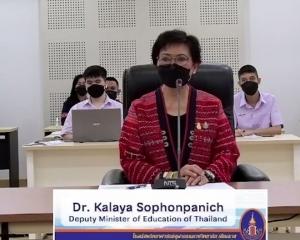But Sir Paul Grant's actions sent a very clear message to his pupils at Robert Clack School in Dagenham - their "anything goes" culture had to change.
And it worked. He managed to curb the appalling behaviour at one of the toughest secondary schools in London, and it went on to achieve the best A-level results in Barking and Dagenham borough, and some of the best in London.
His achievement has won him national respect, and many awards including a knighthood.
Sir Paul was in Dunedin yesterday to offer advice to student teachers at the University of Otago College of Education.
"To me, the secret of children doing very well is very high standards of teaching."
After analysing the teaching techniques of his school's best teachers, he found they all had a "commonality".
"Every one of their lessons had clear learning objectives and good relationships with pupils.
"Staff can't teach if children aren't listening. It's not rocket science."
Sir Paul's visit to New Zealand has coincided with the introduction of National Standards in primary and intermediate schools.
During the past 20 years, the United Kingdom has gone through a similar transformation in terms of central accountability and a focus on the performance of schools.
While he supported the UK's standards, he was upset some media in New Zealand had portrayed him as backing New Zealand's national standards.
Contrary to some reports, Sir Paul said passing opinion on New Zealand standards would be "disrespectful", and it was for New Zealand stakeholders to judge the merits of the standards.
"Accountability and professionalism are both key to a successful school. I'm a strong advocate of the professionalism of the teaching profession and believe that very good teachers accept accountability.
"Teaching is such an important profession that we need to accept that people will look at us and expect us to have high standards."
Sir Paul said having test results in United Kingdom schools seemed to focus the mind and made people accountable.
"Yes, you get people screaming and shouting that you will only teach to the test, but where's the accountability in the tougher, poorer areas? What's the alternative?
"Do we sit back and watch the children fail?
"That's not me saying I don't trust teachers, but I think all human beings need a bit of pressure and having that accountability is the key."
Sir Paul's school introduced an accountability system, which was partnered with a reward scheme.
"I introduced a culture where you couldn't carry on with this appalling behaviour, because you would be held to account. At the same time, if you behaved well, you achieved.
"I built rewards into the system and I got our teaching colleagues to look at the children differently, in a much more professional way.
"We came from a vicious circle into a virtuous circle.
"As relationships improved, achievement improved," he said.











